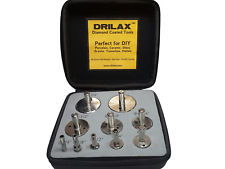
Drill Bit for a Hole: A Comprehensive Guide
When it comes to creating holes in various materials, the right drill bit is essential. Whether you’re a DIY enthusiast or a professional tradesperson, understanding the different types of drill bits and their uses can greatly enhance your efficiency and the quality of your work. In this article, we will delve into the various aspects of drill bits, including their materials, types, and applications.
Materials Used in Drill Bits

Drill bits are available in a variety of materials, each with its own advantages and disadvantages. The most common materials include high-speed steel (HSS), cobalt, and carbide.
| Material | Description | Advantages | Disadvantages |
|---|---|---|---|
| High-Speed Steel (HSS) | Alloy steel with high carbon content | Cost-effective, versatile, and suitable for most materials | Not suitable for high-temperature or abrasive materials |
| Cobalt | Alloy steel with cobalt added | Excellent heat resistance, suitable for high-temperature materials | More expensive than HSS, not as versatile |
| Carbide | Hardened steel with tungsten carbide | Extremely durable, suitable for abrasive materials | Expensive, not suitable for all materials |
Types of Drill Bits

Drill bits come in various shapes and sizes, each designed for specific applications. Here are some of the most common types:
- Spade Bits: Ideal for drilling large holes in soft materials like wood and plastic.
- Brad Point Bits: Used for drilling precise holes in wood, with a sharp point to prevent walking.
- Countersink Bits: Designed to create a countersink at the top of the hole for screw heads.
- Forstner Bits: Used for creating flat-bottomed holes in wood, with a sharp cutting edge.
- Auger Bits: Ideal for drilling large holes in wood, with a spiral design to remove chips.
- Brad Point Auger Bits: A combination of a brad point and an auger bit, suitable for drilling precise, large holes in wood.
- Black & Decker Bits: A range of specialized bits designed for use with Black & Decker drills.
Applications of Drill Bits

Drill bits are used in a wide range of applications, from home improvement projects to industrial manufacturing. Here are some common uses:
- Woodworking: Drilling holes for screws, dowels, and other fasteners.
- Metalworking: Drilling holes for bolts, rivets, and other fasteners.
- Plumbing: Drilling holes for pipes and fittings.
- Electrical Work: Drilling holes for wires and cables.
- Home Improvement: Drilling holes for mounting shelves, pictures, and other fixtures.
- Automotive: Drilling holes for bolts, screws, and other fasteners.
- Construction: Drilling holes for rebar, conduit, and other materials.
Choosing the Right Drill Bit
Selecting the right drill bit for your project is crucial for achieving the desired results. Here are some factors to consider:
- Material: Choose a drill bit made from the appropriate material for the material you’re drilling.
- Size: Select a drill bit with the correct diameter for the hole size you need.
- Shape: Choose a drill bit with the appropriate shape for the application.
- Coating



